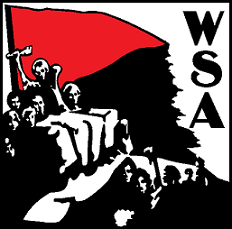Categories
- ACAB (5)
- Animal rights (1)
- Anti-capitalism (15)
- Anti-Imperialism (5)
- Anti-Racism (8)
- Archives (2)
- Austerity (5)
- Culture (10)
- Debate (23)
- Ecology (7)
- Economy (26)
- Education (1)
- Gender & Sexuality (7)
- History (20)
- Housing & Community (7)
- Ideas (21)
- International (34)
- Labor (54)
- Labor Pains (2)
- Magazine (7)
- News Short (11)
- Reviews (13)
- Solidarity (14)
- Solidarity Unicornism (1)
- Syndicalism (8)
- Uncategorized (7)
- WSA (14)
Links
Archives
PDFs for printing
Subscribe
Libertarianism is a Type of Socialism, NOT Classical Liberalism
By Geoff
Libertarianism is a socialist political philosophy which has its roots in the socialist workers’ movements of the 1800s and 1900s. It is especially associated with ideas that came out of the First International (IWA – 1864-1876), especially those of Joseph Proudhon, Karl Marx and Mikhail Bakunin. It was upon these ideas, as well as some of those which came later like those of Peter Kropotkin, that the libertarian syndicalists in Spain formed the CNT union in the early 1900s, with the goal of creating a libertarian (socialist) and workers’ self-managed society. What this means is they wanted emancipation of the working class, recognizing that class struggle comes as a result of resistance to management power over workers, because business owners’ aims are profit-based. This means that managers will submit workers to rigid control in the workplace, cut corners and compensation, heap stress on them, etc., in order to maximize profit. Continue reading “Libertarianism is a Type of Socialism, NOT Classical Liberalism” »
Posted on August 25, 2015
Filed Under History, Ideas | Leave a Comment
The (End) Work Zone: Tales of Spontaneous Rebellion in the Workplace
The normal course of a person’s working life typically produces a plethora of stories where the boss got one over on the employees and faced no retribution; countless unfair firings, anomalies with the paycheck, bullying, mistreatment and abuse. Hidden within, and on the periphery of these tales, is evidence of a small scale class-struggle springing into and out of existence in every imaginable kind of workplace.
While many of these instances of rebellion do not result in long-term organization and often include a small number of workers, these events still play an important role in the class struggle. They become major contributions to a person’s constellation of experience in the workplace that reveals the counterpoised interests of the boss, as well as the potential for resistance. Continue reading “The (End) Work Zone: Tales of Spontaneous Rebellion in the Workplace” »
Posted on July 27, 2015
Filed Under Anti-capitalism, Labor, Labor Pains, Solidarity | Leave a Comment
Erik Olin Wright on the transition to socialism
By Tom Wetzel
In his new book Envisioning Real Utopias, Erik Olin Wright suggests that proposals for a what he calls “democratic egalitarian socialism” — and strategies for transition to such a society — should be evaluated “scientifically” — that is, based on evidence and our best understanding of society — and his book attempts to do this.
In what follows I will look only at Wright’s discussion of strategies for the transition to democratic, egalitarian socialism.
Wright divides transitional strategies into three types, which he calls ruptural, interstitial, and symbiotic. Continue reading “Erik Olin Wright on the transition to socialism” »
Posted on July 24, 2015
Filed Under Ideas, Reviews | Leave a Comment
Grassroots of the Class War
Short updates on three victories at the grassroots in the class war.
SEATTLE SOLIDARITY NETWORK:
“We won the Meniz wage-theft fight!! After months of making trouble for the Meniz Company (and their client, CWD) in every way we could think of, we have finally forced the bosses to pay Jose, in full. He got his money this afternoon.
“This win belongs to everyone who came to the demand actions, sat in the planning meetings, marched on the condo management offices, made a righteous racket to wake up condo residents at 7:30am on a Sunday, and would have come out for more if the bosses hadn’t caved and paid up today.
“We really had to earn this one. Jose had to earn it twice. But as he said today, it was worth it. I don’t know about you all, but I really enjoyed every minute of it. So, let’s revel in it, have a party, and then get ready to make more trouble.”
Video here. Continue reading “Grassroots of the Class War” »
Posted on July 24, 2015
Filed Under News Short | 1 Comment
What is Class Oppression? Who is the Working Class?
Modern Slavery and the Triumph of Capitalism, (Part One)
WSA Memories
Recalling WSA
Why Consensus Decision-making Won’t Work for Grassroots Unionism
All Content is © Ideas and Action 2014. All Rights Reserved. Log in |
Ideas and Action is a publication of the Workers Solidarity Alliance, a revolutionary group rooted in the anarcho-syndicalist tradition.

